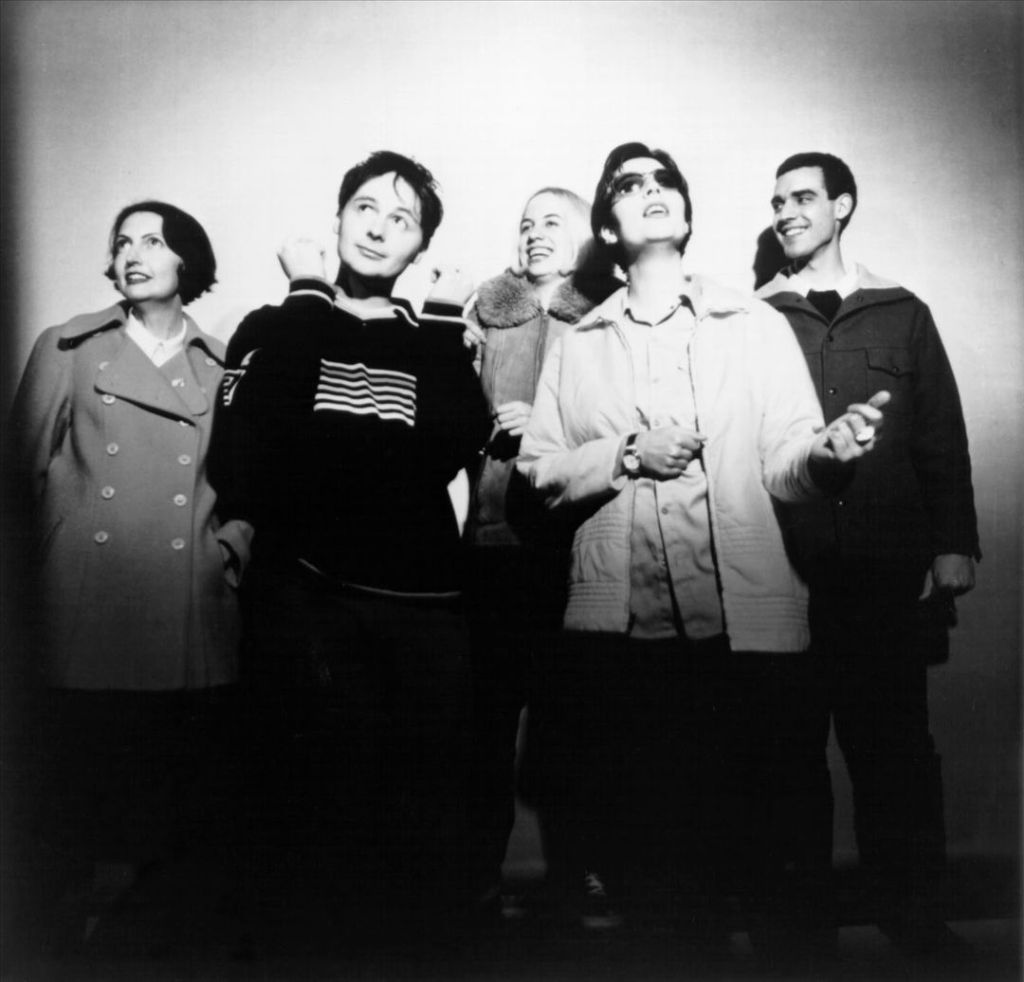During the final three minutes of the last track, “Contronatura,” on Stereolab’s album, Dots And Loops, frontwoman Laetitia Sadier is seething into the microphone. It’s the most frenetic moment of the album. The time signature speeds up and suddenly we’re moved from an anesthetized bossanova to something more insipid—something that sounds a whole lot like the evil twin of disco. On the track, Sadier repeats over and over: “This is the future of an illusion/ aggressive culture of despotism.” These last few minutes show something essential in understanding the legacy of this now 20 year-old album. That switch from breezy cafe pop to urgent dance music establishes the band’s chameleon tendency; both conceptually and sonically. Dots And Loops is multi-genre. It sounds like everything and nothing all at the same time. It’s a collage of decades worth of experimentation in pop music. It’s also an excellent touchstone in understanding the social malaise of the late 90s.
Released in September 1997, Dots and Loops was—and continues to be—a major milestone in the world of experimental pop, and within Stereolab’s expansive discography (during the band’s two decade long career, they released close to a dozen albums and a handful of EPs.) While the album is still a bit more complicated and dense, it is also one of the band’s most sonically accessible albums. It is breezy and sensual despite all the experimentation at play—it manages to sound totally streamlined. However, that sprightly spirit is completely intentional and stands for something more political. Dots and Loops centers on radical leftism and Marxism and serves as a warning of an unkind, dystopian future. The band is tricking us into thinking that what we are listening to is serene. In reality, that serenity is a very topical critique on the numbness of society and how the more comfortable we get with capitalism, the more jaded we become to pain and suffering.
Videos by VICE
The album opens with “Brakage” and, when listening to it, we’re immediately placed in some horrible resort town: no one cares about anything, culture is declining, and society is politically somewhere deep in an abyss. This song sets up the science fiction that is Dots And Loops: we encounter a futuristic society full of strange, cryptic conversations. We are in a literal space of dots and loops. Sadier sings on the track, “We can be bound/run around/ fooled animal bites its own tails.” As these lyrics repeat, there’s sonic meandering and mellow lines of layered synth. Sadier’s voice is gentle to the ear, yet it is a space that precariously walks the line of beautiful sonic benevolence and political, dystopian horror.
The cultural experience in 90s UK and France for Stereolab meant tackling both despotism and exploring the artistic boundaries of living by capitalism. This is an album that teeters between the boredom and fear that come with corruption. The 90s were a tipping point in a lot of ways politically and socially—it is the first contemporary decade that immediately followed the end of the Cold War. For Stereolab, the dust that settles is in political jadedness; ambivalence masked as prosperity. In Dots and Loops that ideology is everywhere. In every atmospheric and lovely sounding song on this album there is darkness behind it. Sadier brings forth different fears about the world in every track, from singing cryptically about people who “will not ever hear a cry,” on the languid “Rainbo Conversation” to the “burdens of guilt,” brought forth in the aptly titled “Prisoner Of Mars.” The heart of Dots and Loops is a very real terror of watching everything crumble away and not really caring; that fear of needing romantic companionship but not really having the energy, and of being on vacation for the sake of proving to everyone that you are still capable of having fun. These fears are certainly gritty, but they are also human.
Dots and Loops is, after all, a pop album. It’s a mix of different, nerdy musical obsessions and discoveries that have come out of the previous few decades. The album is decadent and lush; the band plays with gorgeously drawn out synth samples and percussion, that tips its hat at everything from space age bachelor pad like Esquivel to krautrock like that of Can or Neu!. The way this genre splicing works out is absolutely wonderful. Stereolab paints expansive landscapes with these sounds. The mind numbing beach vacation sampling (used on prior albums but perfected on Dots and Loops) makes you feel like you’re in the 50s version of what the future looks like.
There is sadness in boredom and desire in Stereolab’s chrome-cased opus. Dots And Loops is one of Stereolab’s most future-focused and tightly streamlined albums. The cultural experience of jadedness and angst that Stereolab draws on is one that is aggressively seeping its way back into our own political life in 2017. The way the band draws on these fears, coupled with dreamy and complex pop music makes this album one of their most human works of art. Dots And Loops brings to light a sadness that everyone shares through music that sounds like a comfort. The legacy of this record is just that: making some of our darkest emotions become something palpable and human.
Sophie Kemp is a writer living in Ohio. Follow her on Twitter.




